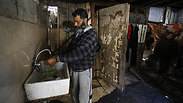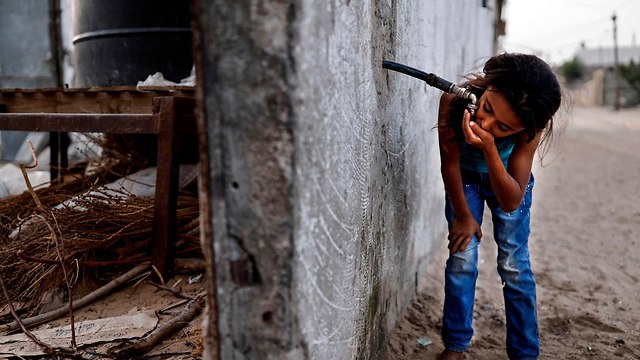

Study: Dire Gaza sanitary conditions could trigger Israel border crisis
Research by academics at Ben-Gurion and Tel Aviv universities, in cooperation with EcoPeace Middle East NGO, shows poor infrastructure in the Strip could trigger an outbreak of diseases that would send Gazans clamoring for help from Israeli authorities.
The dire sanitary conditions in the Gaza Strip might have a direct impact on Israel, as Palestinians seek to flee the growing disaster in the coastal enclave, according to a new academic study.
For years, Israelis in Gaza border communities have been living in constant fear of cross-border terror tunnels and missiles launched from Gaza, in addition to Hamas' recent method of flying airborne incendiary devices from the Strip into Israeli territory. But while the Israel Defense Forces are equipped and trained to face these challenges, this new threat has emerged, and it is equally as dangerous.
The study, obtained by Ynet, was produced after comprehensive research by Prof. Nadav Davidovitch and Barak Hermesh from the Public Health Department at Ben-Gurion University of the Negev, and Maayan Maya of the School of Public Health at Tel Aviv University, in cooperation with EcoPeace Middle East NGO.
It describes a scenario in which epidemics and infectious diseases plague the coastal enclave, prompting thousands of Palestinians to flee their homes and gather along the Israeli border, begging for medical treatment and trying to breach the fence.
Although extreme, this scenario has been realized in other countries and is dubbed the "environmental refugees" phenomenon.
"An ongoing deterioration of the sanitary, environmental and health situation in Gaza might pose the greatest danger (to Israel). A scenario in which Palestinians flock outside Gaza is defiantly plausible," says the study, stressing that the Israelis living in communities bordering Gaza will the first to suffer the consequences.
"A collapse of Gaza's sewage system, water supply system and health system will lead to the outbreak of infectious diseases there, possibly resulting in a desperate population seeking to cross the border into Israel or taking part in violent activities along the security fence," it says.
Moreover, the report argues that the unsuccessful treatment of Gaza's sewage system over the past few years has led to disruptions at the desalination facility in the southern city of Ashkelon, contaminated Zikim Beach and adversely affected activity at Shikma reservoir, which are all in Israeli territory.
Furthermore, the stduy says, contamination at Shikma reservoir could trigger an outbreak of West Nile Fever, a viral infection transmitted to humans through mosquitoes living in water.
"The continuation of the current (sanitary) situation in Gaza poses many risks that constitute a significant strategic challenge, which requires multidisciplinary and multisectoral action," the study says.
"The study's findings reveal a grave environmental and health reality," says EcoPeace Middle East CEO Gidon Bromberg, adding that this new reality could expose "Israel's citizens to a variety of threats— apart from the threats we are currently dealing with—such as the outbreak of plagues and contamination that could claim many lives that neither fences nor the Iron Dome missile defense system would be able to save."

















